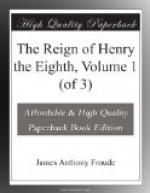This great minister, after the failure of a discreditable effort to fasten upon him a charge of high treason,—a charge which, vindictively pressed through the House of Lords, was wisely rejected by the Commons,—had been prosecuted with greater justice for a breach of the law, in having exercised the authority of papal legate within the realm of England. His policy had broken down: he had united against him in a common exasperation all orders in the state, secular and spiritual; and the possible consequences of his adventurous transgression had fallen upon him. The parliaments of Edward I., Edward III., Richard II., and Henry IV. had by a series of statutes pronounced illegal all presentations by the pope to any office or dignity in the Anglican church, under penalty of a premunire; the provisions of these acts extending not only to the persons themselves who accepted office under such conditions, but comprehending equally whoever acknowledged their authority, “their executors, procurators, fautors, maintainers, and receivers."[287] The importance attached to these laws was to be seen readily in the frequent re-enactment of them, with language of increasing vehemence; and although the primary object was to neutralise the supposed right of the pope to present to English benefices, and although the office of papal legate is not especially named in any one of the prohibitory clauses, yet so acute a canonist as Wolsey could not have been ignorant that it was comprehended under the general denunciation. The 5th of the 16th of Richard II. was in fact explicitly universal in its language, and dwelt especially on the importance of prohibiting the exercise of any species of jurisdiction which could encroach on the royal authority. He had therefore consciously violated a law on his own responsibility, which he knew to exist, but which he perhaps trusted had fallen into desuetude, and would not again be revived. It cannot be denied that in doing so, being at the time the highest law officer of the crown, he had committed a grave offence, and was justly liable to the full penalties of the broken statute. He had received the royal permission, but it was a plea which could not have availed him, and he did not attempt to urge it.[288] The contingency of a possible violation of the law by the king himself had been expressly foreseen and provided against in the act under which he was prosecuted,[289] and being himself the king’s legal adviser, it was his duty to have kept his sovereign[290] informed of the true nature of the statute. He had neglected this, his immediate obligation, in pursuit of the interests of the church, and when Henry’s eyes were opened, he did not consider himself called upon to interfere to shield his minister from the penalties which he had incurred, nor is it likely that in the face of the irritation of the country he could have done so if he had desired. It was felt, indeed, that the long services of Wolsey, and his generally admirable administration, might fairly




